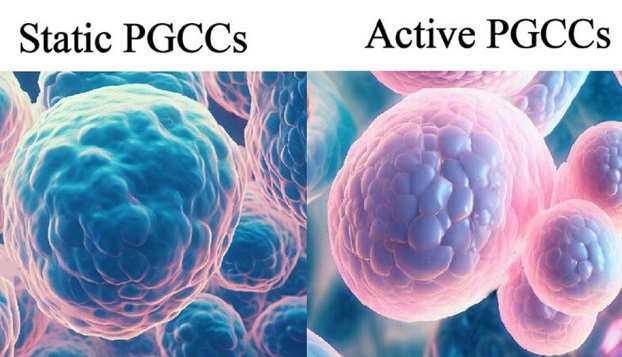Sebastian Lavoie Fact checked by:Thailand Medical News Team Sep 13, 2024 7 months, 1 week, 6 days, 7 hours, 15 minutes ago
Cancer News: Cancer remains one of the leading causes of death worldwide, with nearly 10 million people succumbing to the disease each year. Despite advances in treatment, the battle against cancer continues, especially due to its ability to resist therapies and recur in patients. A groundbreaking study involving international institutions now shines a light on the role of Polyploid Giant Cancer Cells (PGCCs) as potential markers for cancer prognosis and treatment outcomes. This
Cancer News report dives into the findings and what they mean for the future of cancer therapy.
 Predicting cancer outcomes via circulating polyploid giant cancer cells
Predicting cancer outcomes via circulating polyploid giant cancer cells
The study, led by researchers from Hcor Research Institute in Brazil, Cedars-Sinai Cancer Center in the United States, and Rarecells Faculté de Médecine Necker in France, examined 228 patients with different types of cancer. The focus of their research was the presence of PGCCs in the bloodstream and their potential as indicators of poor survival rates among cancer patients.
What Are Polyploid Giant Cancer Cells?
PGCCs are a type of tumor cell that is larger than regular cancer cells and possesses multiple nuclei. Unlike normal cancer cells, PGCCs are more resistant to anticancer therapies and are believed to be involved in cancer recurrence and metastasis. Previous studies have suggested that PGCCs can divide and give rise to new tumor cells, contributing to cancer’s ability to come back even after seemingly successful treatments.
Key Findings of the Study
Researchers collected blood samples from patients diagnosed with six types of carcinomas, including colon, breast, gastric, non-small cell lung cancer (NSCLC), kidney, and anal canal cancers. A unique liquid biopsy method called ISET® was employed to detect circulating PGCCs. The study found that 20.18% of the patients had circulating PGCCs in their blood, with a higher presence in metastatic cases (29.85%) than in non-metastatic cases (14.47%).
During an average follow-up of 44.74 months, the presence of PGCCs in the bloodstream was statistically linked to poor overall survival. Patients with PGCCs had significantly lower survival rates compared to those without. Specifically, the presence of PGCCs in colon cancer patients - who made up the largest group in the study - was strongly associated with poor survival outcomes.
A Potential Prognostic Marker
The presence of PGCCs has emerged as a promising prognostic marker, meaning it can help predict how well or poorly a patient might do over time. This is particularly important because current cancer therapies often fail to address the recurrence of the disease, which is largely driven by the survival and proliferation of resistant cancer cells like PGCCs.
The study underscores that identifying PGCCs in the blood offers a non-invasive way to monitor cancer progression. By detecting these cells early, doctors might be able to better tailor cancer treatments and improve patient survival rates.
/>
Study Results in Detail
In the study, blood samples from 228 cancer patients were analyzed for the presence of PGCCs. Out of the total patients, 46 had detectable levels of these giant cells. The number of PGCCs varied across cancer types:
-Colon cancer: PGCCs were detected in 9 patients (11.84%), with an average of 0.08 PGCC/mL of blood.
-NSCLC: PGCCs were found in 16 patients (35.56%), with an average of 0.24 PGCC/mL.
-Gastric cancer: 9 patients (17.65%) had PGCCs, with an average of 0.11 PGCC/mL.
Interestingly, the study found a statistically significant association between the presence of PGCCs and poor overall survival, particularly in colon cancer patients.
These patients had a 96% survival rate without PGCCs, compared to 76% in those with the cells present. This suggests that detecting PGCCs could serve as an early warning sign for doctors, helping them adjust treatment plans for better outcomes.
The Importance of Liquid Biopsies
One of the key technologies used in this study was ISET®, a liquid biopsy method that allows for the detection of circulating tumor cells (CTCs) and PGCCs.
Traditional biopsies require invasive procedures to collect tissue samples, but liquid biopsies offer a much less invasive option, using just a blood sample. This method is especially useful for monitoring cancer progression and adjusting treatment strategies without subjecting patients to repeated surgeries.
The study's researchers were able to build a biobank of CTCs and PGCCs using ISET®, providing a valuable resource for future research. By analyzing these cells, scientists can better understand how PGCCs contribute to cancer’s ability to spread and resist treatment.
Expanding Cancer Research
While the findings of this study are promising, the researchers emphasize the need for further investigations into the molecular and immunological profiles of PGCCs. Understanding the specific markers associated with these cells could lead to the development of targeted therapies aimed at eliminating PGCCs, thereby improving the effectiveness of cancer treatments.
The study also highlights the heterogeneity of PGCCs, meaning that not all of these cells are the same. Some may have different genetic and molecular characteristics that make them more or less resistant to therapies. Future studies will need to explore these differences to develop more personalized treatment approaches.
Conclusion: A New Era in Cancer Prognosis?
The findings of this study offer hope for a more personalized approach to cancer treatment. By identifying PGCCs as a reliable prognostic marker, doctors can better predict patient outcomes and adjust treatments accordingly. This could lead to improved survival rates and better quality of life for cancer patients worldwide.
However, more research is needed to fully understand the role of PGCCs in cancer progression and resistance. The study paves the way for future investigations into how these cells can be targeted with new therapies, potentially changing the landscape of cancer treatment.
The study findings were published in the peer-reviewed International Journal of Molecular Sciences.
https://www.mdpi.com/1422-0067/25/18/9841
For the latest Cancer News, keep on logging to Thailand Medical News.
Read Also:
https://www.thailandmedical.news/news/the-role-of-circular-rnas-in-gastric-cancer-drug-resistance
https://www.thailandmedical.news/news/how-our-immune-system-s-natural-killers-are-fine-tuned-to-fight-cancer
